Difference between revisions of "Afridev pump"
(→Field experiences) |
|||
| (11 intermediate revisions by the same user not shown) | |||
| Line 1: | Line 1: | ||
| + | {{Language-box|english_link= Afridev pump | french_link= Coming soon | spanish_link= Coming soon | hindi_link= Coming soon | malayalam_link= Coming soon | tamil_link= Coming soon | swahili_link=coming soon | korean_link= Coming soon | chinese_link=Afridev(非洲建设)泵 | indonesian_link= Coming soon | japanese_link= Coming soon }} | ||
| + | |||
[[Image:lever action icon.png|right|80px]] | [[Image:lever action icon.png|right|80px]] | ||
| − | [[Image:afridev pump.jpg|thumb|right|200px|The Afridev pump. Photo: [ | + | [[Image:afridev pump.jpg|thumb|right|200px|The Afridev pump. Photo: [https://www.rural-water-supply.net/en/ RWSN]]] |
[[Image:afridev pump2.jpg|thumb|right|200px|The Afridev pump is popular and well-liked. Photo: [http://www.rural-water-supply.net/en/implementation/handpump-overview/afridev RWSN]]] | [[Image:afridev pump2.jpg|thumb|right|200px|The Afridev pump is popular and well-liked. Photo: [http://www.rural-water-supply.net/en/implementation/handpump-overview/afridev RWSN]]] | ||
| Line 6: | Line 8: | ||
The configuration includes an “open top” cylinder: the piston can be removed from the cylinder without dismantling the rising main. The foot valve is retractable with a fishing tool. | The configuration includes an “open top” cylinder: the piston can be removed from the cylinder without dismantling the rising main. The foot valve is retractable with a fishing tool. | ||
| + | |||
| + | This pump is also known as the [[Deep-well piston handpump]]. | ||
===Suitable conditions=== | ===Suitable conditions=== | ||
| Line 58: | Line 62: | ||
The following projects utilize the Afridev pump. | The following projects utilize the Afridev pump. | ||
<br> | <br> | ||
| − | {|style="border: 2px solid #e0e0e0; width: | + | {{RSR_table |
| + | |1image=project 814.png |1link=http://rsr.akvo.org/project/814/ |1project#=814 |1project name=Malima <br>Well Restoration | | ||
| + | |2image=project 894.png |2link=http://rsr.akvo.org/project/894/ |2project#=894 |2project name=Senjeh <br>Well Restoration | | ||
| + | |3image=project 896.png |3link=http://rsr.akvo.org/project/896/ |3project#=896 |3project name=Gboto <br>Well Restoration | | ||
| + | |4image=project 897.png |4link=http://rsr.akvo.org/project/897/ |4project#=897 |4project name=Behsee Town <br>Well Restoration | | ||
| + | |5image=project 898.png |5link=http://rsr.akvo.org/project/898/ |5project#=898 |5project name=Lebeh Well <br>Restoration | | ||
| + | }} | ||
| + | {{RSR_table | ||
| + | |1image=project 899.png |1link=http://rsr.akvo.org/project/899/ |1project#=899 |1project name=James Town <br>Well Restoration | | ||
| + | |2image=project 900.png |2link=http://rsr.akvo.org/project/900/ |2project#=900 |2project name=>Pifley Town <br>Well Restoration | | ||
| + | |3image=project 902.png |3link=http://rsr.akvo.org/project/902/ |3project#=902 |3project name=Tomah Town <br>Well Restoration | | ||
| + | |4image=project 907.png |4link=http://rsr.akvo.org/project/907/ |4project#=907 |4project name=Billy Town <br>Well Restoration | | ||
| + | |5image=project 910.png |5link=http://rsr.akvo.org/project/910/ |5project#=910 |5project name=Amalu Well <br>Restoration | | ||
| + | }} | ||
| + | {|style="border: 2px solid #e0e0e0; width: 60%; text-align: justify; background-color: #e9f5fd;" cellpadding="2" | ||
|- style="vertical-align: top" | |- style="vertical-align: top" | ||
|[[Image:akvorsr logo_lite.png|center|60px|link=http://akvo.org/products/rsr/]] | |[[Image:akvorsr logo_lite.png|center|60px|link=http://akvo.org/products/rsr/]] | ||
|- style="vertical-align: bottom" | |- style="vertical-align: bottom" | ||
| − | |[[Image:project | + | |[[Image:project 912.png |thumb|center|140px|<font size="2"><center>[http://rsr.akvo.org/project/912/ RSR Project 912]<br>Bonjeh Well <br>Restoration</center></font>|link=http://rsr.akvo.org/project/912/ ]] |
| − | |[[Image:project | + | |[[Image:project 913.png |thumb|center|140px|<font size="2"><center>[http://rsr.akvo.org/project/913/ RSR Project 913]<br>Mellisma Well <br>Restoration</center></font>|link=http://rsr.akvo.org/project/913/ ]] |
| + | |[[Image:project 1330.png |thumb|center|140px|<font size="2"><center>[http://rsr.akvo.org/project/1330/ RSR Project 1330]<br>WASH services & capacity building Liberia</center></font>|link=http://rsr.akvo.org/project/1330/ ]] | ||
|} | |} | ||
| − | |||
| − | |||
===Manuals, videos and links=== | ===Manuals, videos and links=== | ||
Latest revision as of 01:59, 4 March 2019
| |
|
|
|
|
|
|
|
|
|
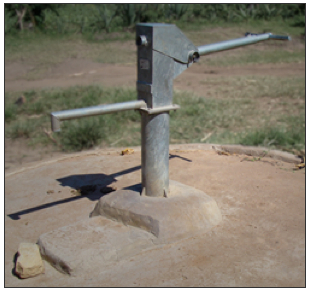
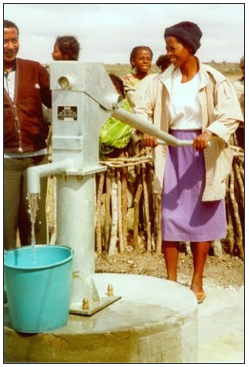
The Afridev Pump is a conventional lever action handpump. It is designed for heavy-duty use, serving communities of up to 300 persons. The maximum recommended lift is 45 m. The Afridev Pump is a public domain pump defined by RWSN specifications. The Afridev Pump is fully corrosion resistant, easy to install and has excellent potential for community-based maintenance.
The configuration includes an “open top” cylinder: the piston can be removed from the cylinder without dismantling the rising main. The foot valve is retractable with a fishing tool.
This pump is also known as the Deep-well piston handpump.
Contents
Suitable conditions
In Pakistan and Afghanistan derivatives of the Afridev Pump with the names Indus, Kabul and Pamir Pump have been developed.
Distribution: throughout Africa, many ten thousands.
| Depths to be used: | 10-45 m |
| Cylinder diameter: | 50.0 mm |
| Maximum Stroke: | 225 mm |
| Approx. discharge (75 watt input): | at 10 m head: 1.4 m³/hour at 15 m head: 1.1 m³/hour |
| Pumping lift: | 10 - 45 m |
| Population served: | ~ 300 people |
| Households: | 30 - 50 hh |
| Water consumption: | 15 - 20 lt/per capita |
| Type of well: | borehole or dug well |
Construction, operations and maintenance
Pump head, handle and pump stand are made of galvanised steel, pump rods of stainless steel or of FRP rods (fibre glass reinforced plastic), rising main of PVC-U pipe (Ø 63 mm), cylinder of PVC-U pipe with brass liner (Ø 50 mm), plunger and foot valve are of brass or plastic. This pump is fully corrosion resistant.
All steel parts of this pump have a potential for local manufacturing. Local companies who manufacture PVC-U pipes and have the knowledge of processing engineering plastics are able to produce the “down-hole components”. Tooling cost are high and therefore the number of manufacturer will be limited.
The installation of the Afridev Pump is not difficult and does not need any lifting equipment. It is however recommended to employ a well-trained crew with the necessary skills for the installation.
This pump has an excellent “Community Management Potential”, it is reliable, easy to repair by a village caretaker and popular with the communities.
Field experiences
The following projects utilize the Afridev pump.
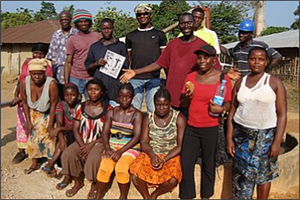 Malima Well Restoration |
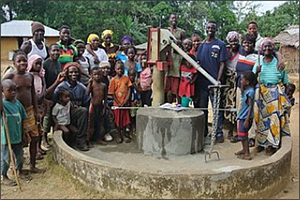 Senjeh Well Restoration |
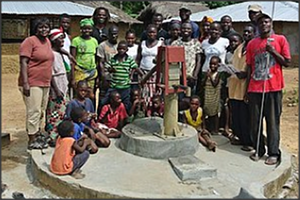 Gboto Well Restoration |
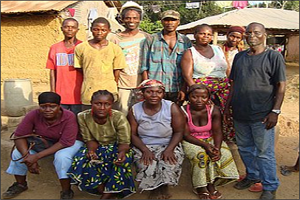 Behsee Town Well Restoration |
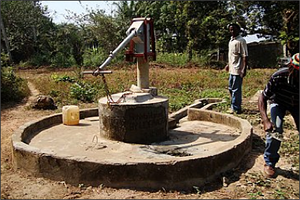 Lebeh Well Restoration | ||
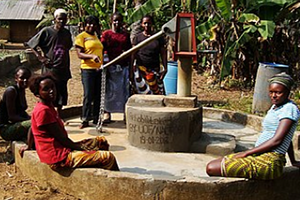 James Town Well Restoration |
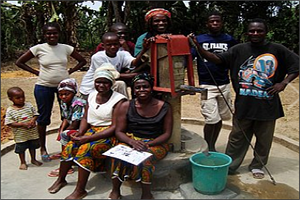 >Pifley Town Well Restoration |
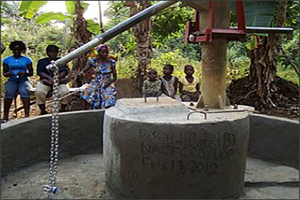 Tomah Town Well Restoration |
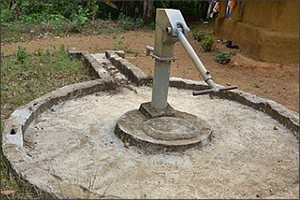 Billy Town Well Restoration |
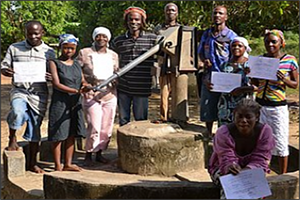 Amalu Well Restoration | ||
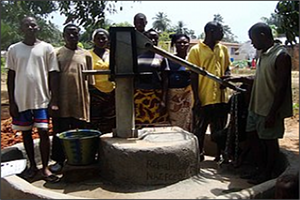 Bonjeh Well Restoration |
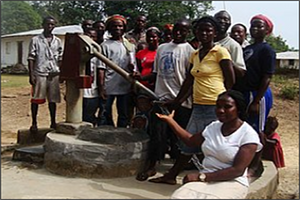 Mellisma Well Restoration |
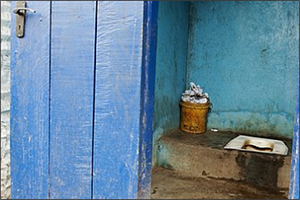 WASH services & capacity building Liberia |
Manuals, videos and links
- Baumann, E. and J. Keen Afridev: Handpump Specification (Revision 5-2007). RWSN/Skat, 2007.
- Afridev: Installation and Maintenance Manual for the Afridev Handpump (Revision 2-2007). RWSN (incl. HTN), 2007.
- Afridev: Pompe manuelle Afridev - Manuel d'installation et d'entretie (français). RWSN (incl. HTN), 1997.
- Afridev: Handpump Maintenance Card. RWSN (incl. HTN), 2009.
- Afridev: Carte de Maintenance pour le Pompe Manuel Afridev (français). RWSN (incl. HTN), 2009.
- Afridev: Handpump Specification: Injection Moulding Manual (Revision 1-1999). RWSN (incl. HTN), 1999.
- Afridev: Guidelines for Quality Control and Quality Assurance of Afridev Handpump, Revision 2-2008. RWSN (incl. HTN), 2000.
- Afridev: Moulds for Afridev Rubber Components (Technical Drawings). RWSN (incl. HTN), 2003.
- Mudgal, A. K., and S. Kumar Afridev: Packaging Guidelines for Afridev. Skat, 1992.
- ERPF, K. Afridev: Handpump with Bottom Support System, Revision 1-2008. Rural Water Supply Network, 2008.
